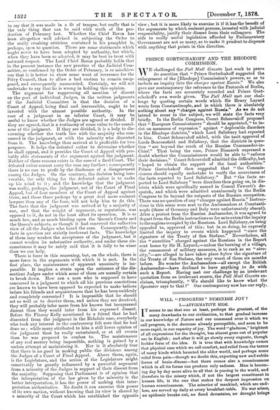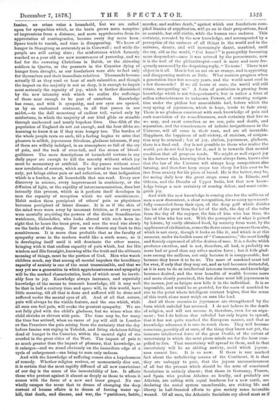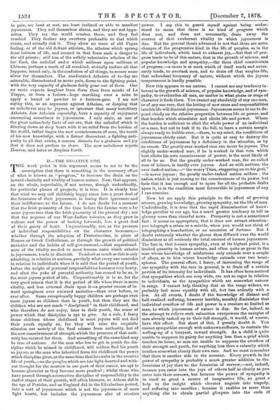IT seems to me that one at least, perhaps the
greatest, of the
many drawbacks to our civilisation, to that gradual increase in our knowledge of Nature and our command over it which we call progress, is the decrease already perceptible, and soon to be more rapid, in our capacity of joy. The word "gladness," brightest of all expressions for the thought, has almost gone out of popular use in English ; and after it will go slowly every cognate, though feebler form of the idea. It is true that with knowledge comes that physical ease which we call comfort, and relief from the terror of many kinds which haunted the older world, and perhaps some relief from pain—though we doubt this, expecting new and subtle forms of brain-disease—but there comes also a consciousness which in all its forms can produce only sadness. Man is becom- ing day by day more alive to all that is passing in the world, and therefore to the misery which, if not the largest constituent in human life, is the one that makes the deepest impression on human consciousness. The miseries of mankind, which are end- less, are served up daily at every breakfast-table. No war arises, no epidemic breaks out, no flood devastates, no drought brings
famine, no crime rains a household, but we are called upon for sympathies which, as the brain grows more receptive of impressions from a distance, and more apprehensive from its appreciation of contingencies, become every day more keen. Space tends to vanish, and time is disappearing. We know of hunger in Shangtung as accurately as in Cornwall ; and while the people are still eating slate ; the misfortunes which formerly reached us a year old are now occurrences of yesterday, and we feel for the cowering Christians in Batuk, or the shivering soldiers in Quetta, or the peasants in the Canaries dying of hunger from drought, as our forefathers were able to feel only for themselves and their immediate relatives. Thousands become actually ill as they read or hear of such calamities, and though the impact on the majority is not so deep, it is enough to impair most seriously the capacity of joy, which is farther diminished by the new intensity with which we realise the sufferings of those near enough to be part of ourselves. Knowledge has come, and with it sympathy, and our eyes are opened, as by an enchanted ointment, to all that passes in our midst,—to the dull monotony of endless toil, varied only by misfortune, in which the majority of our kind glide or stumble through uncheered and nearly hopeless lives. One-fifth of the population of England do not eat enough, and the four-fifths are learning to know it as if they were hungry too. The burden of the whole people rests on each, till a feeling begins to arise that pleasure is selfish, joyousness frivolous, gladness inhuman, if any of them are wilfully indulged, in an atmosphere so full of the cry of pain, and the reek of over-toil, and the steam of blood- guiltiness. The mere descriptions of household torture in any daily paper are enough to kill the serenity without which joy must be momentary or artificial. No day passes without some new revelation of sorrow, which may be actual to one household only, yet brings either pain or sad reflection, or that indignation which is a burden, to all households that can read. Every new discovery in science, every improvement in machinery, or the diffusion of light, or the rapidity of intercommunication, does but intensify this process, which as it perfects itself developer in men the capacity of reception which we call sensitiveness. Habit makes them percipient of others' pain as physicians becomes percipient of latent disease. It is as if the skin of the mind were worn away by incessant friction, as if every man were mentally acquiring the powers of the divine Scandinavian watchman, Heimdaller, who looks abroad with such keen in- sight that he hears the trees grow, and sees the wool rise slowly on the backs of the sheep. Nor can we discern any limit to this sensitiveness. It is more than probable that as the faculty of sympathy arose in the modern world like a sixth sense, so it is developing itself until it will dominate the other senses, bringing with it that endless capacity of pain which, but for His wisdom and His foresight, knowing alike the truth and the ultimate meaning of things, must be the portion of God. Men who watch children much, say that among all mental impulses the hereditary capacity of anxiety is one of the most transmissible, and that we may yet see a generation in which apprehensiveness and sympathy will be the marked characteristics, both of which must be inevit- ably foes to joy. Knowledge always increases, and especially knowledge of the means to transmit knowledge, till it may well be that in half a century time and space will, in this world, have little meaning, till all that is done and suffered will be done and suffered under the mental eyes of all. And of all that occurs, pain will always be the visible feature, and the one which, while all men can feel pain, will evoke the greatest sympathy. We are not fully glad with the child's gladness, but we wince when the child shrieks or shivers with pain. The time may be, for many the time has arrived, when no cause of joy will still in London or San Francisco the pain arising from the certainty that the day before famine was raging in Tobolsk, and living skeletons falling dead of hunger in the Canaries, within the mental sight of the overfed in the great cities of the West. The impact of pain is so much greater than the impact of pleasure, that knowledge, as it enlarges—and we stand obviously on the immediate edge of a cycle of enlargement—can bring to man only sadness.
And with the knowledge of suffering comes also a hopelessness of remedy. Whether religion revives, or momentarily dies out, it is certain that the most rapidly diffused of all new convictions of our day is the sense of the immutability of law. It affects those who protest against it almost as deeply as those to whom it comes with the force of a new and truer gospel No one wholly escapes the sense that to dream of changing the deep current of human affairs is to dream of forcing water up- hill, that death, and disease, and war, the "pestilence, battle, murder, and sudden death," against which our forefathers com- piled litanies of supplication, will go on in their proportions, fixed or mutable, but still visible, while the human race endures. This certainty, revealed by the new knowledge, and accompanied by a perception of the vastness of all things in the world and in the universe, daunts, and will increasingly daunt, mankind, until the cry, old as the world, " Cui bono ? " is perceptibly becoming more despondent—once it was uttered by the pococurante, now it is the wail of the philanthropist—and is more and more fre- quently answered by the despairing reply, " To none ! There is no object in it all. Man is but an ant on an orange, and in appearing and disappearing matters as little. What matters progress when a generation lives but seventy years, and the world must cool in a few thousands ? If we all heave at once, the world will still rotate, unregarding us." A form of pessimism is growing from knowledge which is not Schopenhauer's, but is rather a form of sullen submissiveness to unknown Powers, of cowering resigna- tion under the pitiless but unavoidable hail, before which the very spring of joyousness, which is hope, tends to fade away. There is no gladness consistent with such knowledge of pain and such conviction of its remedilessness, such certainty that live as we may, and exert ourselves as we can, pain and death, and separation, and the consciousness of infinite insignificance in the Universe, will all come in their turn, and are all incurable. Happiness, the happiness of self-victory, of stoicism, of resigna- tion may be attained ; but of joy, elation, joyousness, gladness, there is a final end. Joy is not possible to those who realise the world, yet do not feel hope for it, and it is towards that mental condition that all progress tends. We might as well expect joy in the farmer who, knowing that he must always farm, knows also that the law of the Universe will always keep competitors also farming, and therefore keep crops too cheap for him ever to be free from anxiety for his piece of bread. Ile is the better, may be, for seeing daily how tho great crops come on in Illinois, and Odessa, and the Dooabs of Upper India, but that new know- ledge brings a new certainty of coming defeat, and must extin- guish joy.
And with the new knowledge is coming also for the millions of men a new discontent, a clear recognition, for so many ages merci-
fully concealed from their eyes, of the deep gulf which divides the lot of the poor from the lot of the rich, the day of the toiler from the day of the enjoyer, the fate of him who has from the fate of him who has not. With the perception of what is gained by leisure, by easily obtained food, by security from want, by the appliances of civilisation, comes the fierce crave to possess them also, which is not envy, though it looks so like it, and which is at this moment, under its foolish name of " Communism," the most loudly and fiercely expressed of all the desires of man. It is a desire which produces exertion, and is not, therefore, all bad, is probably no more bad or good than any other motive force ; but it kills glad- ness among the millions, not only because it is unappeasable, but because they know it to be so. The mass of mankind must toil for ever, if only that they may eat, and as toil becomes distasteful, as it is sure to do as intellectual interests increase, and knowledge becomes desired, and the true benefits of wealth become more and more clearly perceived, this fact alone must kill joyousness in the masses, just as fatigue now kills it in the individual. It is so impossible, and would be so grateful, for the mass of mankind to rise to the point where intelligent content begins, that the sense of this truth alone must weigh on man like lead.
And all these enemies to joyousness are strengthened by the form which unbelief has assumed. I do not believe in the death of religion, and will not assume it, therefore, even for an arga- ment ; but I do believe that unbelief has only begun to spread, that it has not quite reached the European masses, and that as knowledge advances it is sure to reach them. They will become conscious, possibly all at once, of the thing they know not yet, the immense intellectual force of the great Doubt, of the extent of uncertainty in which the most pious minds are for the hour com- pelled to live. That uncertainty will spread to them, and in that uncertainty will be an abiding anxiety, amid which joyous-
ness cannot live. It is so now. If there is one marked fact about the unbelieving masses of the Continent, it is that they are unhappy to pain, that the joyous unconsciousness of all but the present which should be the note of convinced Secularism is entirely absent ; that those in Germany, France, and Spain who profess Atheism so loudly, and probably are Atheists, are calling with equal loudness for a new earth, are declaring the social system unendurable, are risking life and liberty in half-frenzied efforts to give society some incurable wound. Of all men, the Atheistic Socialists cry aloud most as if
in pain, are least at rest, are least inclined or able to manifest joyousness. They call themselves slaves, and they are not hypo- crites. They say the world crushes them, and they feel crushed. They declare any overturn preferable to that which exists, and actually risk it. They show no trace of old Pagan feeling, or of the old defiant atheism, the atheism which sprang from fullness of life, and seemed in that form such a danger to the old priests ; still leas of the sulkily submissive atheism of the far East, the unbelief under which millions upon millions of Chinese, perhaps a tenth of all mankind, stoically endure all that happens, intent only, in the confusion of all things, to secure some silver for themselves. The uneducated Atheists of to-day are miserable, discontented to acute pain, fierce to the fighting point, with the very capacity of gladness fairly gone out of them. One no more expects laughter from them than from monks of La Trappe, or from a forlorn - hope marching over a mine to apply a barrel of powder to a fortress-gate. I am not saying this, as an argument against Atheism, or denying that an unbeliever may be joyous, or ignorant that many hereditary Atheists, Jew Atheists especially, have a capacity of enjoyment amounting sometimes to joyousness. I only state, as one of the great melancholy facts of our era, that the unbelief which is filtering down so deep bears with it no relief from the burden of the world, rather tinges the new consciousness of man, the result of his new knowledge, with a fiercer discontent, a fighting anti- pathy to all that exists, a morose distaste for a gladness and joy that it does not profess to share. The new unbeliever rejects Heaven, and hates or despises Earth.








































 Previous page
Previous page